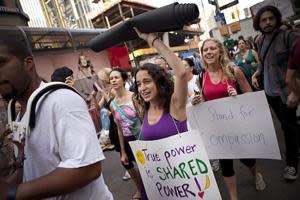 The Lookout
The LookoutOccupy Wall Street isn’t about Wall Street

The popular protests that began last month in lower Manhattan before spreading across the country have generally been characterized, at least in the media's short-hand, as "anti-Wall Street" -- driven by anger about the financial industry recklessness and greed that helped tank the economy.
Given the "Occupy Wall Street" name, and the site of the movement's seminal demonstration, that's hardly surprising. Still, it's a misreading of what's happening -- and one with important consequences.
That's because Occupy Wall Street isn't really about Wall Street at all. It's about much broader economic trends that extend far beyond the financial sector, and have been playing out since well before Goldman Sachs ever got into the subprime mortgage business. We're seeing an echo of this important point now, as demonstrations have spread beyond the nation's financial capital and across the country.
To be clear, it's not as if the protesters are friendly toward the financial industry. But asked what's driving them, many go far beyond Wall Street, and bring up the widening gap between rich and poor, and the increasing stress being placed on America's middle- and working-classes, not to mention the plight of the roughly 26 million Americans who are now out of work. "There's an incredible imbalance of wealth and power in the world," a man who called himself Ox told me in Zuccotti Park last week, adding that he planned to stay there "as long as it takes to develop a system of democracy that can endure."
This broader worry over economic inequality is a response to real developments. As we've reported, since 1979 most groups have seen their incomes barely budge, while income for the top 1 percent of earners has nearly quadrupled. A host of similar statistics tell the same basic story. That growing imbalance is what protesters are getting at with the slogan "we are the 99 percent"--and it's why they'll march uptown today to demonstrate outside the homes of some of the city's richest people, including several who aren't players in the financial industry.
Of course, the movement's reluctance to spell out specific demands, or even to rally around a clear and concise message, has added to the confusion about what's driving the protesters. But the misplaced focus on Wall Street has real consequences. Most important, it's meant that in the rare cases when protesters or their allies have laid out specific demands, those ideas have centered on the financial industry. They've amounted, essentially, to pushing for a beefed-up version of the Dodd-Frank financial reform legislation that President Obama signed into law last year.
These may be worthwhile measures--they might even help prevent the next financial crisis. But they don't get at the root of the problem that's led hundreds of thousands of Americans into the streets in recent weeks: the core sense that the deck is stacked in favor of the wealthy, and that the political system isn't responding.
Those aren't grievances that can be addressed just by outlawing certain risky financial transactions, or upping banks' capital requirements. Indeed, it's not hard to imagine that we could pass new laws that rein in Wall Street, while doing little to make life easier for Americans who are struggling.
Indeed, in some respects, Wall Street's influence is already diminishing. Since the end of 2006, the number of people in the finance and insurance industries has shrunk by 8.1 percent, according to government numbers, and thousands more workers are likely to be laid off this year, thanks to the downturn. Just today, the Wall Street Journal reported on what it calls "Wall Street Shrinkage."
Ultimately, as reckless and cynical as its behavior has been, Wall Street isn't the core of the current problem. That's something many of the protesters themselves actually seem to understand--even if many of the high-profile responses to the protests don't.
Other popular Yahoo! News stories:
• Understanding 'We are the 99 percent'
• Herman Cain nominated for Mustached American of the Year award
• U.S.: Foiled Iran-backed terror plot targeted Saudi ambassador
